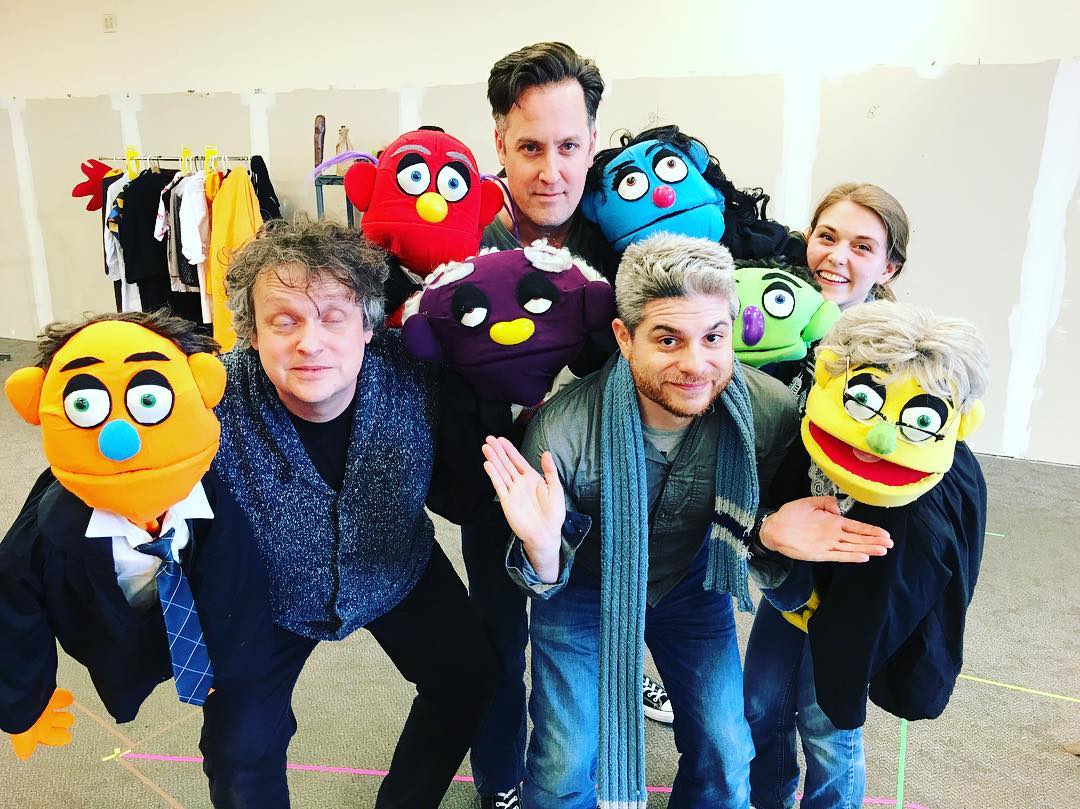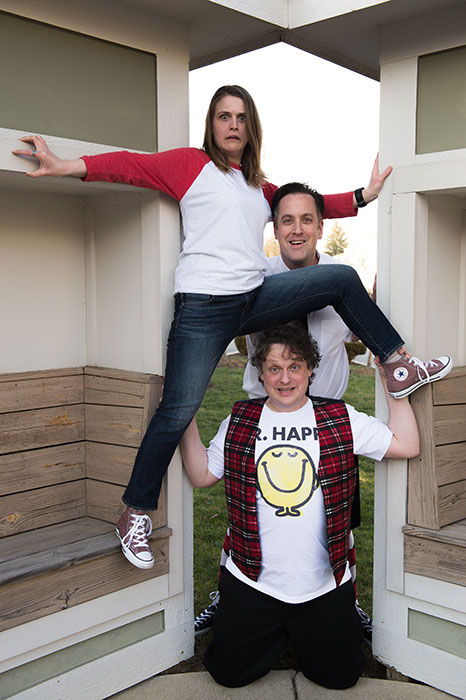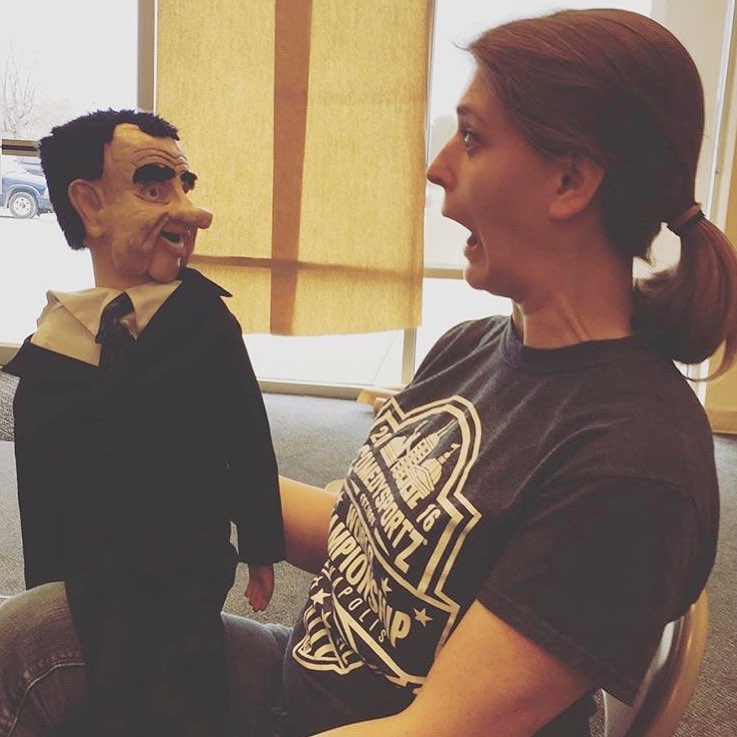— Sponsored Content —

Meet the folks behind Cardinal Stage Company’s production of ‘The Complete History of Comedy (abridged),’ from left to right: Patrick Goss, Henry McDaniel, Jesse Bernstein (director), and Frankie Bolda. Oh! And some of their friends.
As Oscar Wilde put it, “Life is too important to be taken seriously.”
Jesse Bernstein, a Philadelphia-based director and guest director of Cardinal Stage Company’s upcoming production of The Complete History of Comedy (abridged), wholeheartedly adheres to Wilde’s adage. A student of comedy, Bernstein has been memorizing stand-up routines, jokes, and funny movies and books since he was a child.

The 3-person cast having a bit of fun. In the show, the actors portray themselves, in addition to a multitude of characters. From top to bottom: Frankie, Henry, and Patrick. | Photo courtesy of Blueline
“I love all types of comedy — from highbrow to lowbrow, from Vaudeville to sitcoms. And yes, even puns,” says Bernstein. “Comedy really is an art form, a craft, and it has evolved over time. I’m excited to get to share my passion of comedy with Bloomington through this funny play.”
Described by Cardinal Stage as a “non-stop, two-hour laugh fest,” The Complete History of Comedy (abridged) is set to run March 30 through April 15 at the Ivy Tech John Waldron Arts Center Auditorium. The three-person show tells the story of comedy through the ages — after the characters discover an ancient manuscript, called “The Art of Comedy,” and follows their quest to save the world by sharing its wisdom. “The show really is like a history class,” says Bernstein. “Except we only teach the funny bits and the professors are three comics who all probably failed history.”
The show, written by playwrights Reed Martin and Austin Tichenor of the Reduced Shakespeare Company, is part of a body of work that takes long, serious subjects and reduces them to short, sharp comedies. Their first three plays, The Complete Works of William Shakespeare (abridged), The Complete History of America (abridged), and The Bible: The Complete Word of God (abridged) were some of London’s longest-running comedies. The company has also had stops off-Broadway and at the White House, Kennedy Center, Lincoln Center, London’s West End, Seattle Repertory Theatre, American Repertory Theatre, and Montreal’s Just For Laughs Festival.
With Bloomington’s rich comedy scene, The Complete History of Comedy (abridged) has something for everyone, says Bernstein — stand-up, sketch, improv, parody, satire — and of course … pies. And truly, what makes this show unique is its large use of said baked goods, masks, and other creative props.
“In some ways, the props and costume pieces are the show,” says Bernstein. “Because we have three actors who are trying to take the audience through so many worlds, the props and costume pieces tell the audience where they are and who the actors are now. A prop or costume piece that allows you to quickly identify a character is good; if it makes the audience laugh, it’s even better.”
Bernstein says rehearsals for the show have become a grown-up recess where the teacher drops off a ton of silly toys to play with — rubber chickens, roasted chickens, beards, mustaches, and wigs of all shapes and sizes.
“The actors dress up in just about every costume you could imagine — sometimes in a span of just a minute or two they appear as cavemen, mimes, Elizabethan theatre-goers, Monks, and the Supreme Court,” says Bernstein. “And what comedy show would be complete without a Richard Nixon ventriloquist dummy? The answer is none. So we’ve got one of those, too.”
Nailing down the iconography of the many characters and time periods the show covers, Costume Designer and Props Master Nicole Bruce organized, built, or repurposed all the props used in the show.

“What comedy show would be complete without a Richard Nixon ventriloquist dummy? None,” says director Jesse Bernstein. A Nixon dummy is pictured here with actor Frankie Bolda.
In The Complete History of Comedy (abridged) the props become characters, as opposed to other shows in which the audience doesn’t really even notice them, says Bruce. Despite the fact that the show takes you through specific time periods in history, Bruce says the props themselves are all a bit of a sight gag, so she has some leeway in her design. What helps the actors most is simply having the props in hand, so authenticity or accuracy is secondary to the joke.
“Comedy is all about timing,” says Bruce. “A lot of the jokes are prop-specific, helping visually when perhaps language can’t. The show is also dependent on an audience’s pre-knowledge of some of these devices and characters, so what’s exciting is when an audience can anticipate what they think will happen because they recognize a prop or its usual function.”
Bruce says the pies are a great example of this. “I’d be excited to see a pie arrive on stage, because I know what that means!”
One of the many challenges of a prop-heavy show is keeping track of all the props and costumes, Bruce says, and it’s that much more rewarding when they deliver the appropriate response from the audience.
“Staging a show like this is like working on a giant, three-dimensional puzzle — while telling jokes,” says Bernstein. “And part of the joy the audience has in watching a show like this is in seeing how we pull it off — and how well!”
In explaining why a show about comedy is important in these uncertain times, Bernstein paraphrases the witty Brit Winston Churchill: “Never was so much laughter needed by so many from so few.”
“We few who are working on The Complete History of Comedy (abridged) have heard that call for much laughter from the many among the Bloomingtonians,” says Bernstein, “and we’ve come bearing the gift of much laughter.”
— Sponsored Content —

